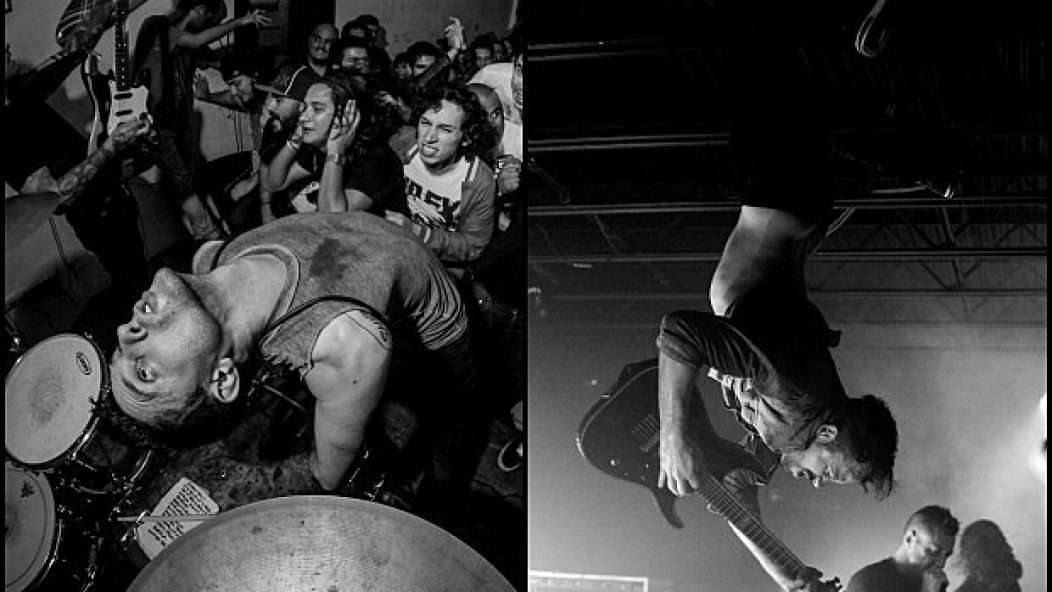
The Dillinger Escape Plan, Retox interview—"I want to be passionate about everything"
In his role as lead guitarist and founder of the Dillinger Escape Plan, Ben Weinman has raised the bar for levels of musicianship, intensity and possibilities in the frequently staid world of metal. Likewise, Justin Pearson has been a fulcrum in the SoCal punk and hardcore scenes, fronting such diverse outfits as Swing Kids, the Locust, All Leather and now Retox. So it was destiny calling that these two aesthetic shit-stirrers would share stages together, and this month DEP and Retox will embark on a tour, accompanied by special guests Trash Talk and Shining. Jason Pettigrew got Pearson and Weinman to discuss their personal histories with each other, the state of music and how passion means different things to all sorts of people.
Interview by: Jason Pettigrew
How long have you guys known each other?
BEN WEINMAN: A long time, man.
JUSTIN PEARSON: We met in Japan.
WEINMAN: Did we?
PEARSON: Yeah, you had your original singer. We did one show in Tokyo together, and I remember your tour manager was talking about getting strippers and, like, art-hookers and stuff. And we were like, “Eh, I don’t know, dude. That’s a no.”
WEINMAN: He’s still talking about that. I just got off the phone with him. He’s like, “Let’s go to this hardcore fest in Canada and just get hookers there,” and I’m like, “Not my thing, but…”
PEARSON: Yeah, we were like, “What are all these robots and sea creatures that you can eat,” and then your dude was like, “There are hookers.” And we’re like, “Yeah, but there are hookers everywhere. There aren’t robots everywhere.”
This would have happened while Dillinger were pimping Calculating Infinity, right, Ben?
WEINMAN: Yes. I was a fan of this young man’s work before I knew him.
PEARSON: Likewise.
WEINMAN: I knew him, and I always loved looking at pictures of the thousands of bands [he was in]. Occasionally there was a penis in one of the shots, so that was a bonus. I was always a fan of Justin; not only his music, but also his punk ethics.
This tour is a pretty solid lineup with the mighty Trash Talk and Norwegian thrash-metal jazz assassins Shining. Did you guys mastermind this tour, or were there booking agents who thought “Hey, let’s put these fuckers together?”
WEINMAN: No. We just wanted to tour with [Retox] for a while, so we just asked them. There were a couple things we had to work out, Live Nation venues [ Pearson steadfastly refuses to play them. —ed.], things like that… Probably at the time, Justin wanted every club to be within five minutes of a vegetarian restaurant. [Laughter.] We’ve known Justin forever, and when we were putting this tour together, we were like, “This is going to be a tour where we like every band.” We’ve done shows like Summer Slaughter and things just to get in front of new kids and pimp ourselves out to a nü-metal crowd, and now we’re going to do our headlining tour. It’s going to be bands that we dig and have the same spirit [as us] in some sense.
Shining were a band we were into and they happened to be available. There were one or two bands we were looking at for the Trash Talk spot, but Trash Talk worked out. We were stoked, because that band is young, and while they don’t come from the same [era] that Justin and I come from, I think they are the closest thing to that vibe. I really like the fans they attract. It’s a lot of kids that are just into hip-hop and skateboarding; they just like the fact that it’s chaos, and they don’t really care about anything else. They don’t really care about a trend or the other bands that are like them; it’s a culture thing, and I dig that.
I remember having a conversation with Justin in Pittsburgh a couple years ago about the whole changing of the guard in hardcore, where lots of underground culture operates away from the prescribed punk-rock rulebook that lifers like to stick in people’s faces.
WEINMAN: I think Justin—unlike a lot of people our age—has an advantage, because he is constantly relevant and active. He’s never acted like, “I’ve graduated from hardcore and punk.” He’s a lifer. With me it’s a little different, because I’m still in the same band and we’re bigger and we’re playing bigger places. I just got off the phone with [Soundgarden guitarist] Kim Thayil ; these are people who unbelievably have become my friends, and they are in bands way bigger than Dillinger. It’s like I’m a little bit out of it, because I’m not going and starting new bands or going out and opening for new bands that are big.
What I have noticed is that [that scene] is fixing itself. A year-and-a-half ago I would have had a very different answer, but I think curation is really becoming important—and I don’t just mean like a guy who writes for Vice but has never been in a band. I just think there’s so much noise and so much garbage coming out, people are really starting to ignore all the fireworks and just find the two or three things that they really like, places they go and get information. Unfortunately, that’s still on the internet, more than going to places and traveling to shows four hours away with your friends and getting on some random message board to find a like-minded person to carpool with. Some scenes I feel represent those days a little bit more in the past two years.
PEARSON: I completely agree. You’re spot on.
Do you think there is some sort of cultural zeitgeist happening, where we’re going to see a lot more bands that are going to be upping the ante in terms of energy and vision? Do you think there is going to be a stronger dedication to an aesthetic or cultural scene?
WEINMAN: Do you mean on a more mass pop-culture scale, like Nirvana and shit? Or do you just mean underground in general?
Underground, but considering anything that would have the potential to break out, if there’s anything strong enough to actually do that.
WEINMAN: I don’t know how much originality is coming out, and that’s not anyone’s fault. It’s really difficult for true paradigm shifts to happen right now, because there is a blueprint on “how to do it” everywhere—on your phone, on your Facebook, on YouTube. Literally, a person can’t come up in the music scene in this day and age without seeing every fucking stage move, outfit and hairdo, like, every five minutes. How could they not be affected by that, you know? It’s not like there’s going to be another David Bowie, just this eccentric person who happens to manifest as a song. I don’t know if that’s going to happen any time soon, and if it does, it’s going to be really special—which is great, because those things should be really special. But I do think things that are at least reminiscent of those days—music that’s more pure, even if it’s not totally original—is happening now. There are full-on grindcore scenes that are thriving. I don’t sit around listening to grindcore all day anymore, but there’s nothing more pure than a bunch of kids making a band they know will never be on the radio. They know there is no way grindcore will ever be big. They’re truly doing it because they dig it and they love it.
PEARSON: Someone messaged me on Facebook saying, “On 91 XM San Diego, they just played the Locust’s ‘Kill Roger Hedgecock,’” which is from our first record. That’s the main radio station in San Diego, and of course people were upset about it—Roger Hedgecock was a politician in San Diego—but it seemed relevant to me. I could hear Dillinger or something similar on a rock radio station, you know? Sure, it wouldn’t be all day long, but I could see [music directors] being like, “Let’s throw this in there.” It would be acceptable, and I’m sure that would happen. But I feel like it’s taken time for the skewed perception of art to be more accepted.
I think a lot of it is beyond music and beyond art. You were talking about there being a blueprint for everything and [The Locust] never had a blueprint. We never had a blueprint for anything: We were like, “this Latin salsa band is awesome,” and then there’s Downcast, and then there’s Crash Worship and all of a sudden, we have made all kinds of friends and influences. It was kind of weird, because people would always be like, “Well, what are your influences?” It’s a really interesting thing to ask, because they always expect you to rattle off a few bands or something. I do have musical influences, but I would say that the better question is, “Why do I listen to the stuff I listen to?” What makes my mind so fucked up to where I want to just go and do the craziest thing I can come up with? And that’s more important than the bands. I’m all about blurring those lines and putting it all under the umbrella of art. I guess it sucks for interview’s sake, but for the most part, if you could just say, “It’s this thing,” then it kind of welcomes everyone, you know? It’s just art, and everyone can be into it.
A big problem now is you see a lot of bands coming up that are influenced by bands less than 10 years old, which is why a lot of scenes sound rigidly the same. You two have been in service to the underground for decades, but it’s not like you’re telling young people, “Sorry, kids, it’s all been done before. Good luck, you suck.” People in your position get jaded by virtue of the fact that they did so much.
WEINMAN: That’s a good way to put it. I don’t know how you feel about it, Justin, but I do feel like I have to be careful. I don’t want to be some jaded fuck, you know? At the end of the day, it’s just about not being egotistical about it. I certainly don’t think I’m the best at anything. But at the same time, I think the fact that we’re somehow still here is what I’m proud of most. That’s what I love about Justin: He stays in there and stays relevant. That’s why I feel like bands like us and Converge need to still exist: We are still relevant, still pushing things, still have a good fanbase, yet we have something to show people. And because we come from a time before YouTube, Myspace and Facebook, before you could watch someone play a show in every country in the world in, like, three seconds without actually having to go to the show and be put into the fire. And the time we come from was not only a time when bands were influenced by the scene, but they were also influenced by their geographic location, socioeconomic situation, the art, culture, politics of where they were from. But that stuff doesn’t exist anymore, because everything’s homogenized and the goal of today’s social experience is for everyone to experience everything at the same time in the same, exact way. Because that’s how you get an IPO.
PEARSON: You totally just nailed it, 100 percent.
The beaten-to-death phrase at South By Southwest this year was “the future of music.” It’s going to be this and it’s going to be distributed like that and it’s going to be consumed by people with these devices. John Rubeli the president of Chop Shop Music, used to work in A&R at a major record label and cut his teeth curating Lollapalooza’s auxiliary stages in the early ’90s. During SXSW, he wrote on his Facebook, “The future of music is music. Period.” Is that an optimistic statement or a pessimist typing?
PEARSON: I would say it’s an optimistic statement, and it obviously isn’t jaded. My problem is everyone’s always trying to evaluate everything and figure out the next step and do all these things. Like honestly, who cares—why don’t we just let it happen? Everyone’s always asking, “What do you think about the future of music or illegal downloading?” I don’t want to think about it, man. I just want to make some music, try to fucking not die and then see what happens. As long as I like what I’m doing, fuck everything else. It’s cool that people respond positively and negatively to what I do, and I’m appreciative of that. But as long as I am happy with what I’m doing, then that’s all that matters—and I would hope that for every artist. If someone has that same outlook, that means he or she has soul, integrity and all these other elements that are really needed for true art. It’s boring rhetoric for journalists, like, “Figure this new thing out!” There’s not going to be a new thing. If anything, if you keep doing it, by the law of the universe, some other entity is going to come out of nowhere and blindside everyone. Everyone for a minute thought Myspace was the be-all, end-all for music, and now Justin Timberlake couldn’t even say that. No one can, so who cares? Let’s discuss more things. I think it’s fucked up that Lady Gaga played South by Southwest: Why isn’t anyone talking about that?
WEINMAN: What does it mean when some band that broke up 10 years ago because nobody cared can come back and make a bunch of money playing Coachella? Does that mean there’s nothing fucking exciting happening?
That is a valid point, but I think a problem with a lot of that is there is that aspect of “the legend.” Everyone remembers that one storied thing they didn’t get to experience, and that’s why reunions are so big. But as a music fan, I would rather hang out with some 18 year-old kid who just got a reissue of the first Public Image album than I would with some 46-year-old dude who’s excited about Soundgarden tickets. There are still relevant things young listeners and would-be musicians could take from that.
PEARSON: If I am jaded, it doesn’t have anything to do with age. It has something to do with industry and weird conglomerates trying to steer things. I am all about the young people: I met this little girl from Tijuana named Zoey. She is probably eight or nine years old, and she came to the Locust show a couple months ago and wanted to meet me so bad. She drew me a picture with crayons, and she legitimately likes the Locust. She got into the Locust through the Yeah Yeah Yeahs and that’s mindblowing. That’s our future; that’s who I would want to hang out with.
WEINMAN: Like we said, there’s this new underground of bands, and one of the reasons we have Trash Talk on the tour is because they’re these young dudes who have the same kind of ethics and things we had coming up. They’re not doing it for money: They truly love the scene. They truly love hanging out with their friends and doing something, pushing the limits, pushing the boundaries. To be honest with you, I’m curious to see what I learn from those guys out there.
If neither of you could play music anymore, what would you do?
WEINMAN: Well, what is music? I have made fart concertos that would make you cry, my friend.
PEARSON: On that last Scott Walker album, he farts in one of the songs. It’s fantastic. It is the earliest form of percussion known to man.
WEINMAN: I was hoping you had an answer to that, Justin, so I could think, because I might kill myself. I mean how can you not make music? There are people out there who are quadriplegic who are writing concertos with their eyes using technology. There are people who are deaf playing percussion, because they can feel the vibrations. I mean, it’d be very hard to not be able to play music and to be in a state worth living.
PEARSON: That’s such a weird question, because until you’re really presented with it, you don’t really know. What would you do? Well, fuck, I don’t know. That’s going to totally alter my entire existence.
I figure you two would still have the desire to focus on the things that are important to you.
WEINMAN: Well, if you’re not doing something fulfilling, then there’s no point in living. It’s funny: There’s this misconception that there’s this thing called “a passionate person,” which is ridiculous. There’s no such thing as a passionate person. It’s like, those people that go on job interviews and, when asked why they should be hired, they respond, “because I’m a very passionate person.” No, you’re not. You have no idea if you’re fucking passionate. You’re passionate about things that make you passionate, so if you’re not doing something fulfilling that you care about, then you’re not passionate about it. I just want to make sure there’s passion in everything I do in my life. I want to be passionate about relationships, my music, everything. So I’ve tried to live a life where I’ve never had to make that false statement to some guy in a job interview. At the end of the day, it’s a matter of finding something you’re passionate about and doing it.
PEARSON: Good answer. Alt
The Dillinger Escape Plan and Retox hit the road with Trash Talk and Shining beginning April 3 in New Jersey. Tour dates can be found on Dillinger's tour page.








